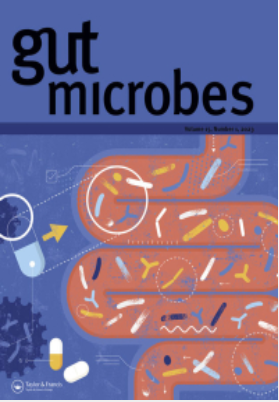来自轻度认知障碍患者的粪便微生物群移植会损害野生型小鼠的脑葡萄糖摄取和认知功能:类杆菌和 TXNIP-GLUT 信号通路。
IF 12.2
1区 医学
Q1 GASTROENTEROLOGY & HEPATOLOGY
引用次数: 0
摘要
肠道微生物群失调被广泛认为与认知障碍有关,但具体细菌类群的特征和机制尚未完全阐明。脑葡萄糖代谢不足与认知能力下降同时发生。本研究以轻度认知障碍患者的粪便微生物群移植(MCI-FMT)为基础,探讨认知、肠道微生物群和葡萄糖摄取之间的联系,并研究 27-羟基胆固醇(27-OHC)诱导的认知功能下降是否涉及类似机制。我们的研究结果表明,MCI-FMT 小鼠表现出学习和记忆力下降,大脑和结肠组织出现形态学病变。大脑中18F-氟脱氧葡萄糖摄取减少,葡萄糖转运体(GLUT1,3,4)表达下调,葡萄糖摄取负调控因子(TXNIP)上调。MCI-FMT 改变了受体小鼠的细菌组成和多样性,而以类菌体丰度增加为突出表现的微生物特征再现了 MCI 细菌定植的负面影响。然而,抑制类杆菌或 TXNIP 会增加 GLUT1 和 GLUT4 的表达,从而显著改善 27-OHC 治疗小鼠的脑葡萄糖摄取和认知能力。我们的研究验证了认知能力下降和脑葡萄糖摄取异常与肠道微生物群失调有关;我们还揭示了类杆菌参与27-OHC导致的认知障碍以及TXNIP相关葡萄糖摄取的分子机制。本文章由计算机程序翻译,如有差异,请以英文原文为准。
Fecal microbiota transplantation derived from mild cognitive impairment individuals impairs cerebral glucose uptake and cognitive function in wild-type mice: Bacteroidetes and TXNIP-GLUT signaling pathway.
Gut microbiome dysbiosis has been widely implicated in cognitive impairment, but the identity of the specific bacterial taxa and mechanisms are not fully elucidated. Brain glucose hypometabolism coincides with the cognitive decline. This study explored the link among cognition, gut microbiota and glucose uptake based on the fecal microbiota transplantation from mild cognitive impairment individuals (MCI-FMT) and investigated whether similar mechanisms were involved in 27-hydroxycholesterol (27-OHC)-induced cognitive decline. Our results showed that the MCI-FMT mice exhibited learning and memory decline and morphological lesions in the brain and colon tissues. There were reduced 18F-fluorodeoxyglucose uptake, downregulated expression of glucose transporters (GLUT1,3,4) and upregulated negative regulator of glucose uptake (TXNIP) in the brain. MCI-FMT altered the bacterial composition and diversity of the recipient mice, and the microbial signatures highlighted by the increased abundance of Bacteroides recapitulated the negative effects of MCI bacterial colonization. However, inhibiting Bacteroidetes or TXNIP increased the expression of GLUT1 and GLUT4, significantly improving brain glucose uptake and cognitive performance in 27-OHC-treated mice. Our study verified that cognitive decline and abnormal cerebral glucose uptake were associated with gut microbiota dysbiosis; we also revealed the involvement of Bacteroidetes and molecular mechanisms of TXNIP-related glucose uptake in cognitive deficits caused by 27-OHC.
求助全文
通过发布文献求助,成功后即可免费获取论文全文。
去求助
来源期刊

Gut Microbes
Medicine-Microbiology (medical)
CiteScore
18.20
自引率
3.30%
发文量
196
审稿时长
10 weeks
期刊介绍:
The intestinal microbiota plays a crucial role in human physiology, influencing various aspects of health and disease such as nutrition, obesity, brain function, allergic responses, immunity, inflammatory bowel disease, irritable bowel syndrome, cancer development, cardiac disease, liver disease, and more.
Gut Microbes serves as a platform for showcasing and discussing state-of-the-art research related to the microorganisms present in the intestine. The journal emphasizes mechanistic and cause-and-effect studies. Additionally, it has a counterpart, Gut Microbes Reports, which places a greater focus on emerging topics and comparative and incremental studies.
 求助内容:
求助内容: 应助结果提醒方式:
应助结果提醒方式:


